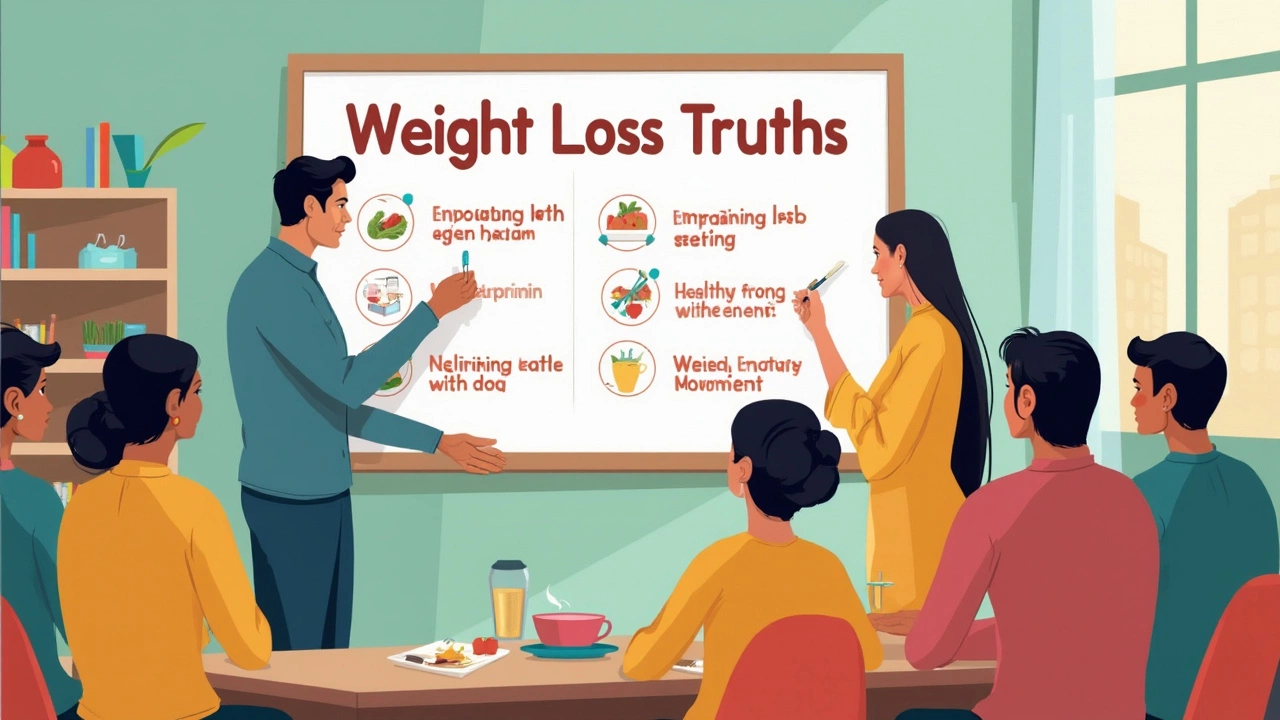- Home
- ::
- Weight Loss Clinic Secret: The Real Key to Shedding Pounds

Weight Loss Clinic Secret: The Real Key to Shedding Pounds
Everyone asks for that magic pill for weight loss, but let's get honest—no clinic has a secret stash of miracle potions. I've seen people walk through those doors hoping for a shortcut, but what separates those who actually lose weight from those who give up? It’s accountability. Not just showing up to an appointment, but having someone track your progress, call you out when you’re off, and celebrate actual milestones with you. Without it, sticking to any plan gets real tough, real fast.
You don’t need eight different apps or a shelf of powders. The most successful clients I’ve seen in clinics are the ones who built killer habits, not the ones who tried to hack the system. A simple meal journal works better than the fanciest tracker if you use it every day. Having a coach or a support group pushes you through the days when motivation tanks—which, believe me, happens to everyone.
- The Power of Accountability
- Habits Over Hype
- Why Clinics Make the Difference
- Action Steps You Can Start Today
The Power of Accountability
If you ask the hard-hitters at any weight loss clinic, they'll tell you that accountability isn’t some buzzword—it's the backbone of real results. Clinics keep people on track because you’re not just answering to yourself; you’re reporting to someone who cares about your progress, and honestly, who’s rooting for you but won’t sugarcoat things if you slack off.
Here's a cool stat: According to a 2023 survey from the Obesity Action Coalition, people who checked in weekly with a weight loss coach lost on average 35% more weight in a year compared to those who tried doing it all solo. That’s a huge difference for something as simple as showing up and talking about where you’re at.
| Support System Type | Average Annual Weight Loss |
|---|---|
| No support | 5 lbs |
| App/Remote | 8 lbs |
| In-person clinic | 16 lbs |
The process isn’t about shaming anyone, either. Most clinics use progress tracking in three big ways:
- Regular weigh-ins so you see changes (not just trust your jeans).
- Meal and activity journals that coaches review—sometimes spotting where things are stalling.
- Weekly or bi-weekly feedback that celebrates wins and suggests honest tweaks.
This keeps slipping up from turning into giving up. On the days you want to bail on your plan, knowing your coach has eyes on your progress can be that nudge to keep moving forward. Priya’s a prime example: After years of yo-yo dieting, it was only when she started clinic check-ins with a straight-shooting nurse that things finally clicked. She says the honest feedback, not just encouragement, made all the difference—and the data says she’s not alone.
Habits Over Hype
Here's the tough truth: most people don't stick to their weight loss goals because they chase hype and ignore habits. Just look at the flood of products screaming for your attention—keto cookies, detox teas, celebrity workouts. They might sound cool but hardly ever lead to lasting results. Real change comes from what you actually do every day, not what you buy in a sudden burst of motivation.
According to data from the CDC, more than 42% of American adults are considered obese as of 2023. The crazy part? Most weight regain happens because people can't stick to new routines. It's not metabolism, or bad genes for most of us. It's the daily choices that add up. Here's a quick look at the numbers:
| Factor | Impact on Long-Term Success |
|---|---|
| Daily calorie tracking | Keeps 60-70% on track |
| Weekly weigh-ins | 40% higher sustained loss |
| Crash diets | 80% regain weight in a year |
| Regular physical activity | 54% maintain loss |
I’m not saying you have to become a robot. But making simple, repeatable actions automatic—like prepping meals on Sunday or walking after dinner—helps more than any new supplement. Most weight loss clinics hammer this point because it works. If you nail the basics, everything else gets easier.
Dr. Yoni Freedhoff, an obesity expert, put it best:
“The least sexy advice tends to work best. Long-term, sustainable changes happen when we focus on habits, not quick fixes.”
If you want to win at this, focus on building a couple of healthy habits instead of jumping on every trend. Some practical starting points:
- Choose one meal to prep for the week (lunch is usually easiest).
- Write down everything you eat for three days—no judgment, just the facts.
- Schedule a daily walk, even if it’s just for ten minutes.
- Ask a friend or partner to check in with you once a week.
It’s not flashy, but these small moves are why clinics can actually help. The hype fades; habits stick.

Why Clinics Make the Difference
If you’re wondering why folks swear by weight loss clinics, it’s not just about the meal plans or fancy equipment. The game changer is the mix of personal support, custom strategies, and medical insight you can’t pull from a random YouTube channel.
Regular clinics offer a team: doctors, dietitians, counselors, and sometimes trainers, all in one spot. That group approach means you get answers from real pros, not internet guesswork. For example, they’ll run blood tests to flag any hidden problems making weight loss feel impossible, like hypothyroidism or a hormone imbalance. You get a plan that’s actually tailored to your body, not a copy-paste diet the clinic hands to everyone.
There’s another factor—straight accountability. At a clinic, you check in. You step on a scale. And when you slack off, someone actually says, “Hey, what happened this week?” Numbers don’t lie, and seeing trends on a chart hits hard. According to the American Board of Obesity Medicine, medical supervision results in up to weight loss secret success rates 30% higher than going it alone. That’s not just marketing—it’s real people, losing real pounds, tracked by someone who actually cares.
| Approach | Average Weight Loss in 6 Months |
|---|---|
| Clinic Program with Medical Supervision | 8-12% of body weight |
| DIY/Online Programs | 3-5% of body weight |
Another underrated bonus is group support. In-person or virtual clinic groups help you swap practical tips and share the rough days. I’ve seen people team up for meal prepping, swap healthy recipes, and even keep each other honest on cheat days. That sense of community can be the push you need when the couch seems easier than the gym.
So, clinics bring more than just another meal plan. They help you spot what’s blocking your progress, give you hands-on support, and hold you to your goals. No app or book can replace that.
Action Steps You Can Start Today
Ready to get results? Here are no-nonsense action steps straight from the playbook of every solid weight loss clinic. The ideas aren’t fancy, but they work if you do them consistently.
- Track What You Eat: Before you stress about calories, just jot down everything you eat for a week. This alone makes most people rethink their snack choices. Studies have shown food journaling can double weight loss success compared to winging it.
- Pick a Weekly Check-in: Set up a weigh-in or body measurement every week on the same day. If you can, rope in a buddy or join a local group. Accountability multiplies results—clinics rely on this because it works.
- Swap Out One Bad Habit: Don’t overhaul your life overnight. Pick just one thing—like cutting sugary sodas or swapping fried snacks for fruit. Stick with it for a month. Little wins build real momentum.
- Prep Your Meals: Spend a few minutes each Sunday making a batch of healthy lunches or snacks. The less you have to think in the middle of a busy day, the less likely you’ll fall for takeout.
- Move—Even If It’s Ten Minutes: You don’t need a gym. Walk on your lunch break, dance in your living room, or do push-ups beside your bed. Clinics tell clients that consistency beats intensity every time.
None of these steps is complicated, but together, they give you the structure you need. When people ask me about the weight loss secret, I always point to these basics. Try them out for a month and watch what happens.

 Health and Wellness
Health and Wellness





Write a comment